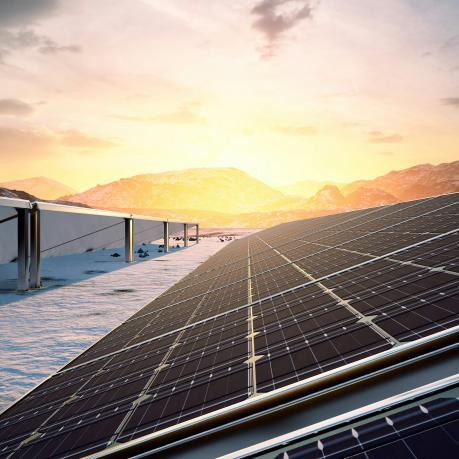
From ambition to implementation: delivering the energy transition and industrial transformation in 2026
Insight by Sandra Ghosh, Susanne Lein
News publ. 07. Jul 2022

The opening event was dominated by two major themes: the recently ended G7 summit at Schloss Elmau and Russia’s ongoing war against Ukraine. Both events also have a direct impact on climate policy cooperation across the Atlantic. “For this reason, the goal of this year’s conference is to discuss and formulate answers to these challenges,” said Dennis Tänzler, Director and Head of Programme Climate Policy at adelphi and Director of the adelphi TCB team, in his welcoming speech.
Government representatives from the three TCB countries then had their say. Patrick Graichen, State Secretary in the Federal Ministry for Economic Affairs and Climate Protection, spoke of the biggest energy crisis in Germany since the Second World War and emphasised that the current high oil and gas prices are primarily affecting households and companies. This has enormous economic and social consequences. “But the answer to this energy crisis is the same as that of the climate crisis: renewables, efficiency and electrification.” The diversification of energy sources – for example through the import of liquefied natural gas (LNG) – in the coming months and years will not affect climate goals, assured Graichen. He also welcomed the results of the G7 summit, such as the commitment to achieve a largely carbon-free electricity sector by 2035, or the agreement to drive industrial transformation through accelerated decarbonisation.

Patrick Graichen, State Secretary at the Federal Ministry for Economic Affairs and Climate Action (BMWK)
Andrew Light, Assistant Secretary for International Affairs in the U.S. Department of Energy, also considered the G7 results “productive and promising”. The energy crisis has shown “that states cannot be dependent on suppliers who may weaponize supplies against them,” Light added. Among other things, he brought up the idea of a mechanism for a price cap on Russian oil in order to reduce Putin’s wealth and avoid a global recession.
The Canadian Climate Institute is Canada’s leading research organisation on climate change. Its chairman, Rick Smith, found that the G7’s decisions are important because they outline priority areas for international cooperation. “They extend the argument for climate progress to areas of public policy that are relatively new, at least in Canada” – climate as a cornerstone of foreign policy, reducing greenhouse gas emissions as a requirement for competitiveness, or the energy transition as a security imperative. In the face of wars, pandemics, historically difficult economic times, progress on climate protection should be accelerated because it is a remedy for the volatility of the world.

Rick Smith, President of the Canadian Climate Institute
According to Sabine Nallinger, head of Stiftung KlimaWirtschaft, it is now time to translate the agreements from the G7 summit into concrete, collective action – or in her words, “Now it’s time to walk the talk!” No partnership is more important than the cooperation between Germany, the EU, the USA and Canada when it comes to taking action after Elmau. For the transition to climate-neutral economies, however, all G7 countries must be more ambitious when it comes to climate protection, said Nallinger. The plan to establish a G7 climate club by the end of 2022 is an important step in this direction.
In the second part of the opening event, journalists who deal with climate issues had their say. Brett Simpson, freelance journalist, and Bob Berwyn, reporter at Inside Climate News, noted that the Transatlantic Climate Bridge Conference is the ideal moment to establish a common diplomatic language. This requires clear definitions and the harmonisation of climate policy standards. “It’s a good opportunity not only to set common goals for the future, but also to explore what it means to achieve those goals despite different national contexts,” said Simpson. What can journalists do better when reporting on climate issues? “Journalists could report on these things with more heart, more feeling, and intuition, and try to use language that people understand, that they can respond to, and that they can connect with emotionally,” Berwyn suggested.

Bob Berwyn, reporter at Inside Climate News, Sven Egenter, moderator and editor-in-chief Clean Energy Wire, and Brett Simpson, freelance journalist
The Transatlantic Climate Bridge Conference 2022 is taking place online on July 6-8, 2022. It aims to further strengthen the climate and energy alliance between Germany, the United States and Canada. adelphi heads the TCB consortium, an initiative to promote cooperation on climate policy between Germany, the USA and Canada.
More information is available on the TCB website.